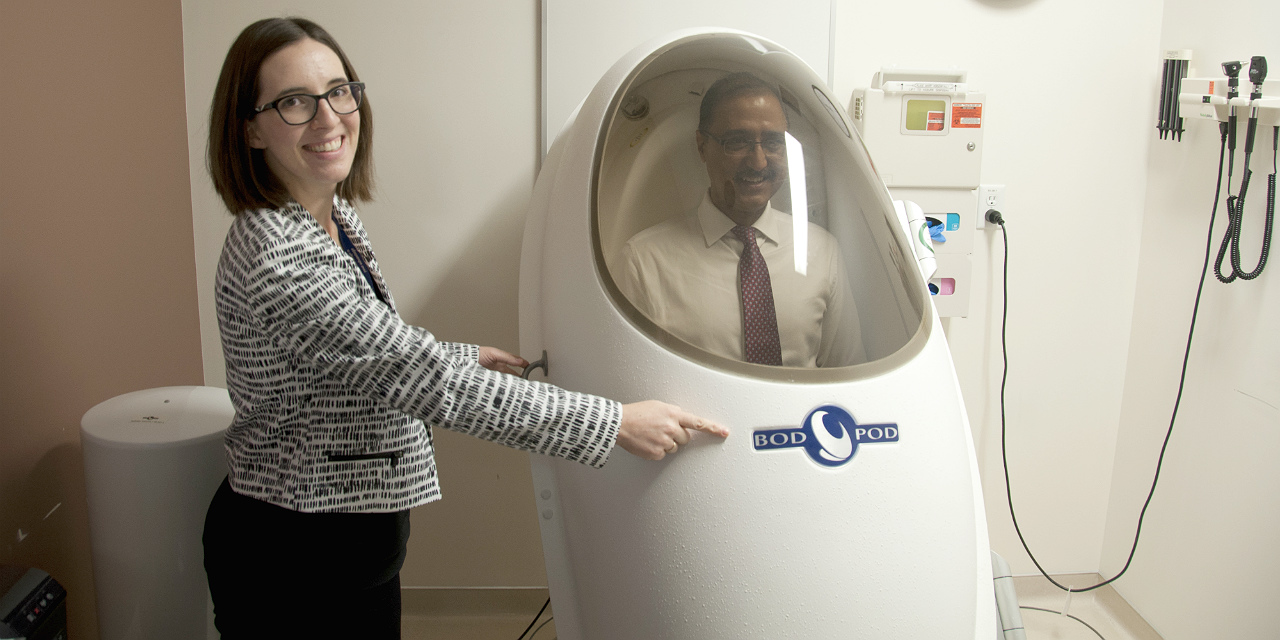
Human nutrition research co-ordinator Stephanie Ramage seals Minister Amarjeet Sohi in the university's body composition tracking system as part of a tour of the Alberta Diabetes Institute, which figured prominently in a federal government funding announcement Jan. 25. (Photo: Michael Brown)
Determining whether exercise can play a role in improving the quality of life for people with high blood pressure as a result of chronic kidney disease is one of 30 health-related projects to share in $19.2 million the University of Alberta received today in federal funding from the Canadian Institutes of Health Research.
Stephanie Thompson, a U of A medical researcher, said patients with chronic kidney disease are managed much like patients with pulmonary or cardiac ailments, but unlike them, no exercise program exists for people with high blood pressure.
"An exercise program is an important intervention that is missing from our toolkit in how we care for patients," she said. "This focus of this project is blood pressure control and really trying to fit exercise into what we are already doing so we can see how it can really benefit patients."
Although exercise is part of the guidelines for treating people with high blood pressure, very few physicians recommend exercise because of a void in the research.
Thompson explained regular exercise is known to lower blood pressure, but because of differences in the causes of high blood pressure in people with chronic kidney disease, it is unclear whether exercise would work in this population. Consequently, exercise is not included in the routine care of people with chronic kidney disease and sedentary behaviour is common.
"Our current standard care is nothing," said Thompson. "We certainly don't have any resources for counselling or providing a means for people to safely exercise."
In her randomized study, 160 people with moderate to severe kidney disease will follow a largely home-based, 24-week exercise regime, supervised by an exercise professional.
"Our findings will be used to show that exercise can improve the care we deliver and will provide the basis for further studies looking at whether exercise can slow the worsening of kidney disease," she said. "We're also going to vigorously monitor their antihypertensives to see if we can actually decrease the number of pills they take, which is important to patients and has potential economic benefit as well."
Amarjeet Sohi, minister of infrastructure and communities, was on campus to make the announcement. He visited with a host of U of A award recipients including pediatric gastroenterologist Dawei Zhang, whose lab received a grant to study new ways of treating the hardening of arteries that is partly responsible for the 50,000 strokes and 75,000 heart attacks that occur in Canada every year.
Another researcher on hand for the announcement was emergency medicine researcher Patrick McLane, whose grant will allow his team to conduct a collaborative study with First Nations partners to find ways of improving the quality of care First Nations peoples receive in emergency departments.
"Health sciences research is the foundation of strong health-care systems and healthy societies," said U of A president David Turpin. "The University of Alberta's health sciences faculty are leaders, discovering vital new knowledge, creating innovative treatments and revolutionizing technologies. This investment is a vote of confidence in their work-the 30 projects funded today will help improve the lives of Albertans, Canadians and people around the world."
ALES projects funded
René Jacobs, $761,175
Intestinal phosphatidylcholine synthesis, dietary lipid handling and the metabolic syndrome
Catherine Field, $511,429
Establishing dietary treatment with DHA as part of neoadjuvant chemotherapy for breast cancer
Rhonda Bell, $294,524
Maternal iron nutrition and its consequences in pregnant women and their children in the Alberta pregnancy outcomes and nutrition (APrON) study